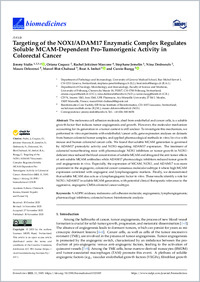Targeting of the NOX1/ADAM17 Enzymatic Complex Regulates Soluble MCAM-Dependent Pro-Tumorigenic Activity in Colorectal Cancer
DOKPE
- Stalin, Jimmy ORCID University of Fribourg
- Coquoz, Oriana University of Fribourg
- Jeitziner Marcone, Rachel ORCID University of Lausanne
- Jemelin, Stéphane University of Geneva
- Desboeufs, Nina University of Fribourg
- Delorenzi, Mauro ORCID University of Lausanne
- Blot-Chabaud, Marcel University of Aix-Marseille
- Beat, Imhof ORCID University of Geneva
- Ruegg, Curzio ORCID University of Fribourg
- 2023
Published in:
- Biomedicines. - MDPI AG. - 2023, vol. 11, no. 12, p. 3185
NADPH oxidases; melanoma cell adhesion molecule
angiogenesis
lymphangiogenesis
pharmacologic inhibitors
colorectal tumor
bioinformatic analysis.
English
The melanoma cell adhesion molecule, shed from endothelial and cancer cells, is a soluble growth factor that induces tumor angiogenesis and growth. However, the molecular mechanism accounting for its generation in a tumor context is still unclear. To investigate this mechanism, we performed in vitro experiments with endothelial/cancer cells, gene expression analyses on datasets
from human colorectal tumor samples, and applied pharmacological methods in vitro/ in vivo with mouse and human colorectal cancer cells. We found that soluble MCAM generation is governed by ADAM17 proteolytic activity and NOX1-regulating ADAM17 expression. The treatment of colorectal tumor-bearing mice with pharmacologic NOX1 inhibitors or tumor growth in NOX1-deficient mice reduced the blood concentration of soluble MCAM and abrogated the anti-tumor effects of anti-soluble MCAM antibodies while ADAM17 pharmacologic inhibitors reduced tumor growth and angiogenesis in vivo. Especially, the expression of MCAM, NOX1, and ADAM17 was more prominent in the angiogenic, colorectal cancer-consensus molecular subtype 4 where high MCAM expression correlated with angiogenic and lymphangiogenic markers. Finally, we demonstrated that soluble MCAM also acts as a lymphangiogenic factor in vitro. These results identify a role for NOX1/ADAM17 in soluble MCAM generation, with potential clinical therapeutic relevance to the aggressive, angiogenic CMS4 colorectal cancer subtype.
from human colorectal tumor samples, and applied pharmacological methods in vitro/ in vivo with mouse and human colorectal cancer cells. We found that soluble MCAM generation is governed by ADAM17 proteolytic activity and NOX1-regulating ADAM17 expression. The treatment of colorectal tumor-bearing mice with pharmacologic NOX1 inhibitors or tumor growth in NOX1-deficient mice reduced the blood concentration of soluble MCAM and abrogated the anti-tumor effects of anti-soluble MCAM antibodies while ADAM17 pharmacologic inhibitors reduced tumor growth and angiogenesis in vivo. Especially, the expression of MCAM, NOX1, and ADAM17 was more prominent in the angiogenic, colorectal cancer-consensus molecular subtype 4 where high MCAM expression correlated with angiogenic and lymphangiogenic markers. Finally, we demonstrated that soluble MCAM also acts as a lymphangiogenic factor in vitro. These results identify a role for NOX1/ADAM17 in soluble MCAM generation, with potential clinical therapeutic relevance to the aggressive, angiogenic CMS4 colorectal cancer subtype.
- Faculty
- Faculté des sciences et de médecine
- Department
- Médecine 3ème année
- Language
-
- English
- Classification
- Pathology, clinical medicine
- License
- CC BY
- Open access status
- gold
- Identifiers
-
- DOI 10.3390/biomedicines11123185
- ISSN 2227-9059
- Persistent URL
- https://folia.unifr.ch/unifr/documents/327473
Statistics
Document views: 35
File downloads:
- biomedicines-11-03185-1_0.pdf: 66
